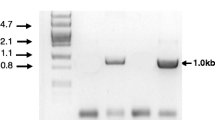Abstract
The Alternaria alternata apple pathotype causes Alternaria blotch of susceptible apple cultivars through the production of a cyclic peptide, host-specific toxin, AM-toxin. We recently cloned a cyclic peptide synthetase gene, AMT, whose product catalyzes the production of AM-toxin and showed that it resides on chromosomes of 1.8 Mb or less, depending on the A. alternata apple pathotype strain. Reverse transcriptase (RT)-PCR, using primers specific to AMT, on laboratory sub-cultured strains previously shown to produce AM-toxin, identified one isolate that did not express the gene. A leaf necrosis bioassay confirmed an AM-toxin-minus phenotype. However, an original isolate of this strain which had not undergone sub-culture gave a positive result by both RT-PCR and bioassay. Contour-clamped homogeneous electric field electrophoresis and Southern hybridization demonstrated the loss of a 1.1-Mb chromosome in the non-toxin-producing isolate. Since this chromosome can be entirely lost without affecting growth, but is necessary for pathogenicity, we propose it is a conditionally dispensable chromosome.
Similar content being viewed by others
Author information
Authors and Affiliations
Additional information
Electronic Publication
Rights and permissions
About this article
Cite this article
Johnson, L.J., Johnson, R.D., Akamatsu, H. et al. Spontaneous loss of a conditionally dispensable chromosome from the Alternaria alternata apple pathotype leads to loss of toxin production and pathogenicity. Curr Genet 40, 65–72 (2001). https://doi.org/10.1007/s002940100233
Received:
Accepted:
Published:
Issue Date:
DOI: https://doi.org/10.1007/s002940100233




